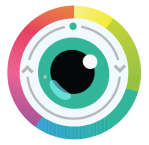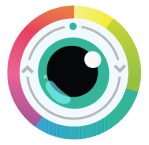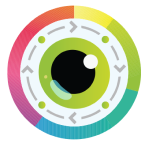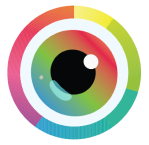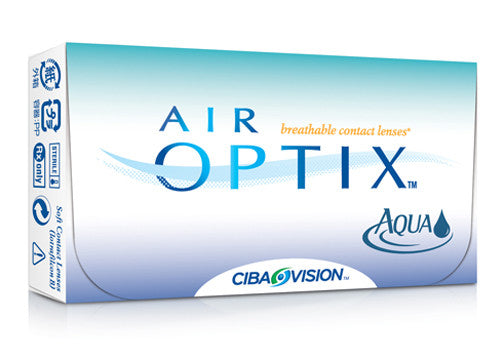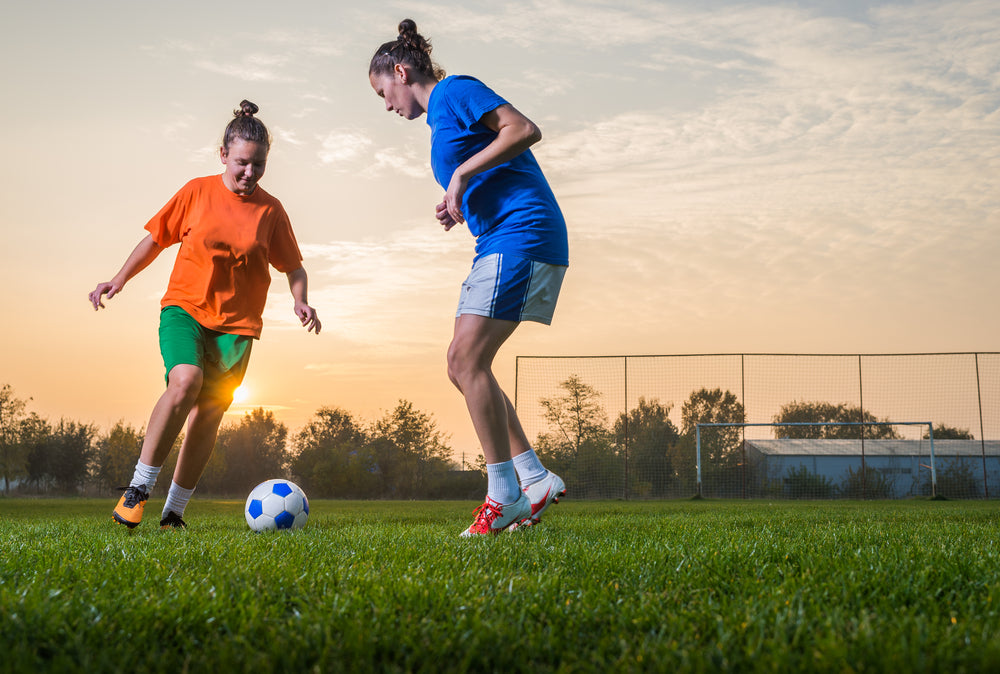
Of course, being a purveyor of Canadian contact lenses, we are partial to contacts here at Fresh Lens. That’s not to say we have anything against a stylish pair of specs. They’re awesome for wearing at night after you take your contacts out (no one likes a blurry Netflix binge). They can also be an excellent fashion accessory. However, when it comes to precision tasks, outdoor fun or physical activity, contact lenses are king – or queen. There isn’t much debate as far as contact lenses vs glasses for sports because contact lenses win hands down. While sports goggles can work, most people are reluctant to wear them. Sure, a strap for your glasses is fine for a brisk walk, but not much more. Going without any vision correction won’t exactly help your game either. Short of having laser eye surgery, there isn’t a better option than contact lenses for athletes and we’re here to answer all of your burning questions on the topic.
Is it Safe to Wear Contact Lenses While Playing Sports?
Can you wear contact lenses while playing sports? Of course! It’s actually recommended and they’re safer than eyeglasses since the lenses in glasses can break causing injury to yourself or your opponent and without having all around vision, you might miss that soccer ball coming straight for your head. In fact, glasses aren’t allowed in some sports like boxing, rugby or football. Also, movement will jar your glasses and not only will your vision suffer, but you’ll spend time pushing them up your nose. If they fall off and break or you sustain a blow to the face, they’re expensive to replace. Contacts, on the other hand, especially soft ones, are less likely to fall out, don’t require adjustment and if they do happen to dislodge, it’s a whole lot cheaper to get new ones. Head gear, face masks, helmets and protective eyewear don’t always fit over glasses so contacts will be your only real choice.
Safety is definitely a major bonus of wearing contact lenses for sports. However, performance is also a key reason to go the contacts route. Contact lenses mold to the shape of your eye and move with it for much better vision correction. You’ll be able to see crisply and clearly. Since there are no frames and they cover the eyeball, you have your entire field of vision, including peripheral vision, which is highly important when you need a quick reaction time. There’s less magnification so the size of objects is accurate and consistent and you’ll have better depth perception. Contacts don’t bounce up and down, which is essential for stability. Sweat and weather conditions won’t cause fogging and rain splatter has no effect, unlike with glasses or sports goggles.
There is an exception to all of this and that’s any sport involving water, especially swimming. Exposing your contacts to tap water or water in oceans, lakes, rivers or even swimming pools puts you at risk for irritation, corneal ulcers and other potentially blinding conditions, and serious infections. There are microbes and viruses in water and soft lenses are porous, so the bad stuff worms its way in there, reaching your eyes. One of the worst is Acanthamoeba, which, while rare, will stick to your contact causing inflammation and infection of the cornea and this can result in a permanent loss of vision or make a corneal transplant necessary. Oceans and chlorinated pools are safer than rivers or lakes but the salt content in oceans can make contacts fall off your peepers. Chlorine burns, is irritating and the contacts absorb it. When this happens, they tighten against your eyes (not exactly comfy). You might be thinking it will all be cool if you wear hard contacts but these will probably just float away and you’ll be back where you started with poor vision.
If you’re involved in freshwater sports, opt for prescription goggles instead of contacts. If you really want to wear contacts and you swim in chlorinated pools or take on the mighty ocean, some experts say you can get by with wearing tight-fitting goggles over your contacts so water doesn’t touch them. After swimming, take your contacts out and let them soak in multipurpose solution for a good 24 hours to kill any bacteria. Wear a back up pair or your glasses while they’re disinfecting or, better yet, invest in daily disposable lenses and just throw them away.
If you play a contact sport or anything where balls, sticks, elbows, fingers or debris fly your way, just know that there are an estimated 40,000 sports-related eye injuries every year in the United States, including abrasions, contusions, hemorrhages, detached retinas, cataracts, corneal lacerations and even the loss of an eye. Believe it or not, baseball is the most common culprit when it comes to eye injuries for kiddos ages five to 14 and basketball leads the pack for 15- to 24-year-olds. So, are contacts good for sports in these instances? Yes. They’re still preferred for performance reasons. However, for optimal vision and safety, combining contact lenses with protective face shields, polycarbonate wraparound sports goggles, face masks or whatever other form of protection is recommended for your sport is the way to go.
The Pros and Cons of Glasses, Sports Goggles and Contact Lenses for Sports
EYEGLASSES
Pros:
- The lenses can possibly prevent debris from getting in your eye if it’s coming at you head on.
- They could thwart an opponent’s finger as long as the potential eye poke isn’t forceful enough to break your glasses.
Cons:
- If you’re hit in the face, your glasses could break causing serious injury.
- They’re expensive to replace if they are broken.
- You have limited peripheral vision.
- The frames can obstruct your view.
- Sometimes, lenses can magnify or minimize objects and cause distortions.
- Not all safety equipment fits well over glasses (i.e., masks, helmets or goggles)
- Sweat and weather conditions can cause fogging.
- Rain splatter makes it hard to see in outdoor sports.
- Reflections on the lens surface can hamper your performance.
- When you’re running or jumping, your vision won’t be stable since the glasses will move.
- They fall off easily with certain motions.
PRESCRIPTION SPORTS GOGGLES
Pros:
- They protect your eyes from debris.
- Goggles can prevent a ball, stick, finger or elbow from hitting your eyeball.
- They’re usually made from impact-resistant materials, so they won’t shatter like glasses can.
- Prescription goggles are ideal for watersports.
- With wraparound varieties, you’ll have better peripheral and all around vision than you would with regular glasses.
- They hold steadier than eyeglasses and don’t require as much adjusting.
Cons:
- Not everyone loves how they look.
- Depending on the design, they might not work with helmets or other equipment.
- It’s difficult to get the perfect fit.
- Fogging can occur when you’re sweating or due to the weather.
- Rain splatter will obscure vision.
- Peripheral vision and depth perception may not be 100%.
- Unless they fit like a glove, your vision won’t be as stable when you’re in motion as it will be with contacts.
- It takes a while to get used to wearing them and they’re not always comfortable.
- Reflections can occur in some types.
CONTACT LENSES
Pros:
- Contacts offer clearer, crisper eyesight.
- Your field of vision won’t be obstructed by eyeglass frames.
- They provide all around vision, including peripheral vision.
- You’ll have better depth perception.
- They’re comfortable.
- The lenses mold to the shape of your eye so your vision is stable even when you’re moving and you’ll experience less distortion.
- They stay put and won’t fall off like glasses or need to be adjusted.
- They aren’t susceptible to fogging.
- You won’t have to worry about rain splatter or sweat.
- They look fantastic, obviously.
- They don’t affect the fit of helmets or other equipment.
- If you do lose a contact, they’re a lot cheaper and easier to replace than eyeglasses or prescription goggles.
- Contacts aren’t made of glass or polycarbonate that can break and injure you.
- You won’t have to deal with reflections and there’s less glare than with eyeglass lenses.
Cons:
- If you get poked in the eye, you could lose a contact.
- Eye irritation will occur if debris gets underneath of the lens.
- They’re not ideal for swimming.
- They don’t protect your eyes from injury.
What are the Best Contacts for Athletes?
Athletes who are nearsighted or farsighted will benefit most from soft contact lenses. They’re less likely to fall out, they’re much more comfortable than gas permeable (GP) lenses and they come in daily and extended wear options, like Air Optix Night & Day, for convenience.
For those with astigmatism, GP lenses will usually give you better eyesight than their soft counterparts, which is something to keep in mind as better vision will help with your performance. Additionally, GP lenses are hard, so debris accumulation is less likely to be a problem for those who play outdoor sports. There’s also a lower occurrence of dry eye. Unfortunately, hard contacts dislodge much easier so they’re not always the preferred type, particularly for contact sports like rugby or football. The newest toric lens designs, such as Acuvue Oasys for Astigmatism, are more stable and give crisper vision so you might not have to compromise. Hybrid lenses can be another good option for athletes with astigmatism as they have a soft material on the outside. You get the visual benefits of GP lenses and the comfort and staying power of soft contacts but they’re more expensive and labor intensive.
Regardless of whether you have nearsightedness, farsightedness or astigmatism, comfort and moisture retention are important. Dry eyes and protein deposits cause irritation and hamper your visual acuity. When your contacts are bothering you, you’re also more likely to try to rub your eyes and touching your lenses with dirty, sports hands is definitely a no-no. GP lenses are good for people with extreme dry eyes if they’re tolerable. However, thanks to innovations in materials, there are plenty of soft lenses that allow your eyeballs to stay moist throughout the day. Daily disposable contacts aren’t as drying and you won’t have to worry about buildup since you start each day with a fresh pair. We love 1-Day Acuvue Moist and Dailies AquaComfort Plus, both of which are also available for astigmatism.
When determining the best contact lenses for sports, you’ll also have to take your particular activity of choice and the conditions you play or participate in into account. For example, if you’re involved in ultra marathons or mountain climbing where you probably don’t have access to soap for your hands and you’re on the move for long periods of time, it might not be practical to handle or change your contacts as needed. In these cases, extended wear options are likely best suited to you. If you travel a lot for your sport, live a very active lifestyle, engage in outdoor activities with dirt galore, or, as we mentioned earlier, you’re a swimmer, daily disposable lenses will be preferred. You won’t need multipurpose solution or a case and if you get debris in your eye or a lens falls out, you can just throw it away and begin anew.
Some athletes are convinced that custom-tinted contacts offer improved contrast and less glare. This enhances vision and reaction time. Since they’re custom, you can’t usually get them online or at regular stores. For these specialty sports contact lenses, an eye doctor who focuses on sports vision can point you in the right direction. Another feature that’s good for outdoor sports is UV protection to keep your eyes safe. Acuvue Oasys and Biotrue ONEday have UV-blocking capabilities.
There are the rare people who just can’t wear contacts for one reason or another. In these cases, polycarbonate, wraparound, well-fitted prescription sports goggles are a lot better than regular glasses. You’ll be able to have a pretty wide field of vision, they’ll remain stable and they won’t shatter. In other cases, if contacts aren’t feasible and you’re not a candidate for vision correction surgery, orthokeratology, sometimes called ortho-k or corneal refractive therapy, is a possibility. With this method, you wear special gas permeable contact lenses only at night while you sleep and they temporarily reshape the cornea so you can see more clearly during the day without glasses or contacts.
Don’t let eyeglasses hold you back from doing the activities you love and doing them well. Give your sports performance a boost and keep your eyeballs safe by wearing contacts. It’s always best to visit an eye care professional to fit you with the right lenses and help you find the best option for your vision needs. If you decide to wear contacts, check out our selection of the top brands perfect for active folks. Order your contacts online in Canada and the U.S. at Fresh Lens and take advantage of our free shipping, so you can see clearly on and off the field (or court, or ice, or trail or wherever your competitive spirit takes you).
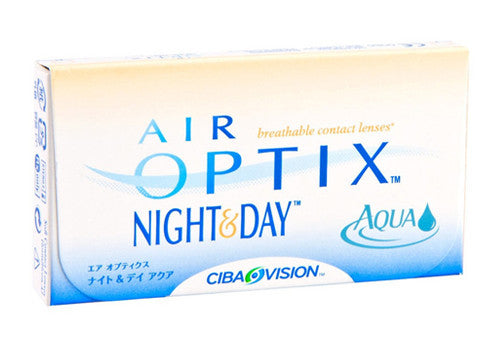 AIR OPTIX AQUA NIGHT AND DAY |
 ACUVUE OASYS FOR ASTIGMATISM |
